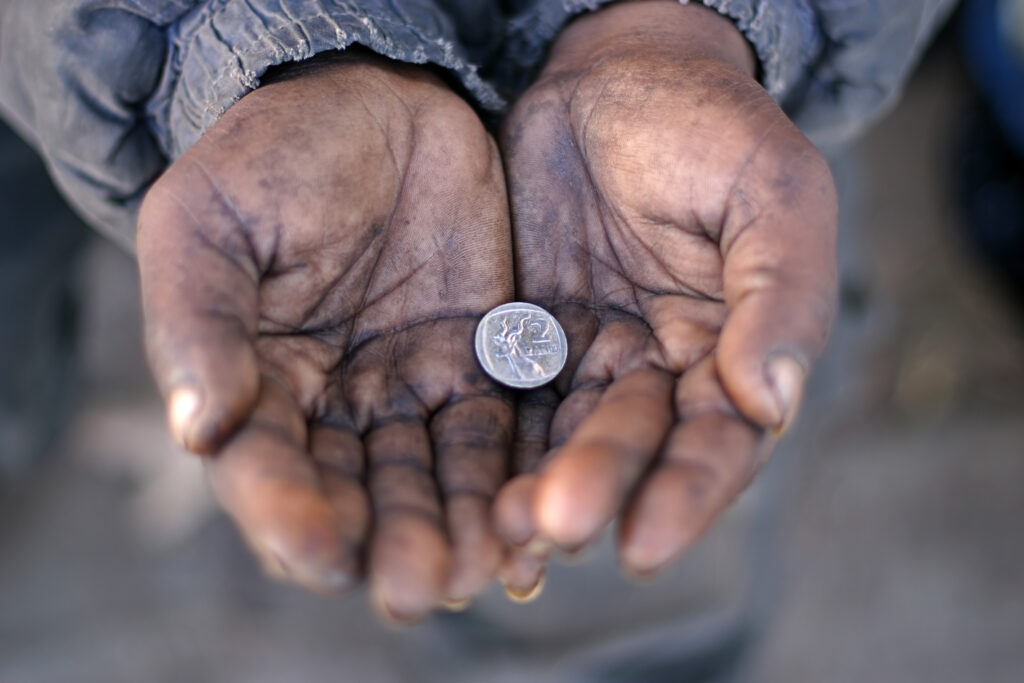Most of us have wrestled with the question of whether to support a panhandler. Does our lack of knowledge about how our gift will be used make us morally culpable?
If you’ve ever had an argument with someone about how philanthropy ought to work in our society—the goals it ought to pursue, or the desires that ought to motivate it—you’ve probably brought up that apocryphal figure, The Beggar in the Street.
It’s philanthropy’s very own thought experiment. But unlike many thought experiments, it’s not impractical. Depending on where you live, it might even be a question you have to answer daily: what should you do when someone approaches you on the street and asks for money?
You don’t have to be a philanthropist to have an opinion (though if you consider yourself a philanthropist, you almost certainly do have an opinion). Whether your answer is ‘yes’ or ‘no,’ your response probably hinges on what you think the man is likely to do with your money. Will he buy food? Will he buy drugs? Will he return to his suburban home and pay his cable bill, hardly able to believe the world is so full of suckers?
Similarly, refusing the panhandler’s request might be intended to serve as a nudge toward specific actions. Not giving him money is one way of motivating him to find a job, which will do immeasurably more to improve his life than putting a dollar in his coffee cup—or so one might argue.
Philosophers have debated for centuries about how we ought to determine whether a given action is morally justified. Some have argued that an action’s outcome has no bearing on whether that action is moral. Others have argued that the outcome informs the morality. If the year is 1940 and a Nazi soldier knocks on your door, are you justified in lying about the Jews hiding in your attic? Lying might be wrong in the abstract, but lying to save a life might be okay.
One consequence of the hyper-connected, data-informed nature of modern life is that it’s harder and harder for us to plausibly claim ignorance about the results of our actions. In one of the best essays I’ve ever read, Wilfred McClay describes what he calls the “strange persistence of guilt.” In short, we feel guilty because we know the negative consequences of everything we do and fail to do:
“Whatever donation I make to a charitable organization, it can never be as much as I could have given. I can never diminish my carbon footprint enough, or give to the poor enough, or support medical research enough, or otherwise do the things that would render me morally blameless. Colonialism, slavery, structural poverty, water pollution, deforestation—there’s an endless list of items for which you and I can take the rap. To be found blameless is a pipe dream, for the demands on an active conscience are literally as endless as an active imagination’s ability to conjure them.”
The world is too much with us. One is paralyzed by the concatenating effects of one’s actions. As McClay suggests, a consequence of this paralysis is undue fascination with guilt. I would suggest another is undue fascination with data.
It is the hair of the dog: more data to cure the ills of too much data. The dream of big data proponents is to quantify every action’s chain of reactions. It is to know, with certainty, how many hours will be added to your life if you exercise, drink red wine (or don’t drink red wine), drink coffee (or don’t drink coffee), or take regular vacations. It is to know, down to the decimal, how to reverse the effects of colonialism, slavery, structural poverty, water pollution, deforestation, and other maladies of our age. It is also to identify the precise statistical correlation between the act of giving a beggar $2 and a measurable increase in that beggar’s quality of life.
Drowned out by the mighty winds of data is the still small voice suggesting that acts of generosity don’t always need to be evaluated by their “outcomes.”
Maybe I am justified in giving money to the panhandler not because research has demonstrated that most panhandlers have good intentions, nor because a raft of studies provides evidence that my gift is statistically likely to improve his life. I’ll never know what he does with the few dollars I give him. I’ll never know if his life is a little better or a little worse or entirely unchanged.
Perhaps I’m justified in giving him money—in giving a gift to a neighbor—simply because he asked.






I had struggled with this when I was younger. I remember turning down someone asking for some money in a New York City McDonald’s when I was a young adult. He immediately got up and left. My mom was with me that day and heard my response to him. When she addressed my reaction, I explained that I felt justified in refusing him with the argument of not knowing where the money was going and that I worked hard for my money and didn’t want it to go to drugs. She pointed out that I could have bought him a breakfast — after all he was sitting in McDonald’s. I will never forget that lesson. Now I usually carry around an apple or other food, or in some cases I invite them to have a lunch with me. I get to hear their story as I meet them as person worthy to spend time with and not as a leper. Interesting people who I have chosen to believe they are down on their luck.
If it is a ruse, well that’s on them. “Who is my neighbor?”
Interesting, but I was curious why you did not mention the consequence of encouraging such pan-handling in the first place. By giving money to a beggar, it encourages him/her, along with other beggars to ask for the same each day. Is it not better to donate the same $2 to a food-bank and inform the beggar of its address? If we do not want beggars on the streets, we should stop encouraging them, and donate to the proven, knowledgeable shelters best positioned to help them (in more ways than what the $2 will buy).